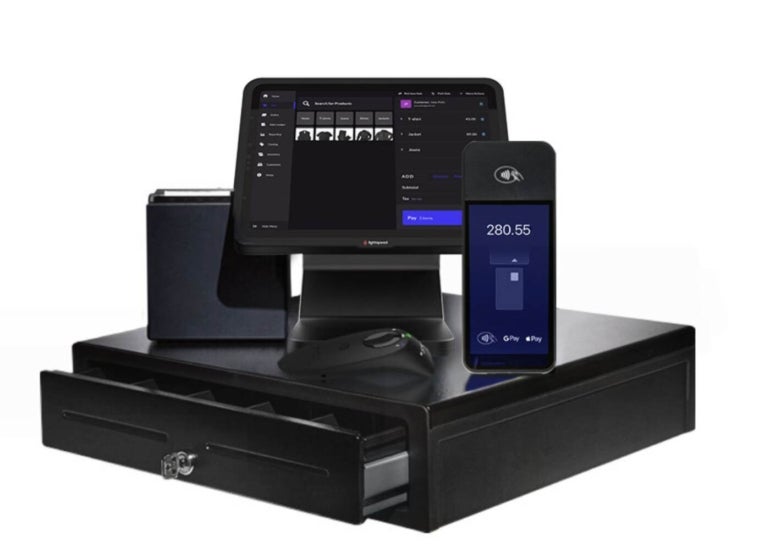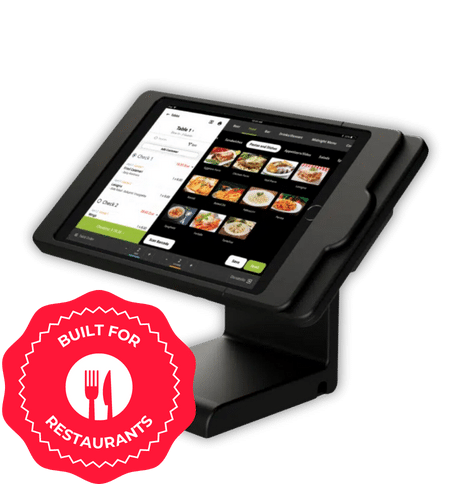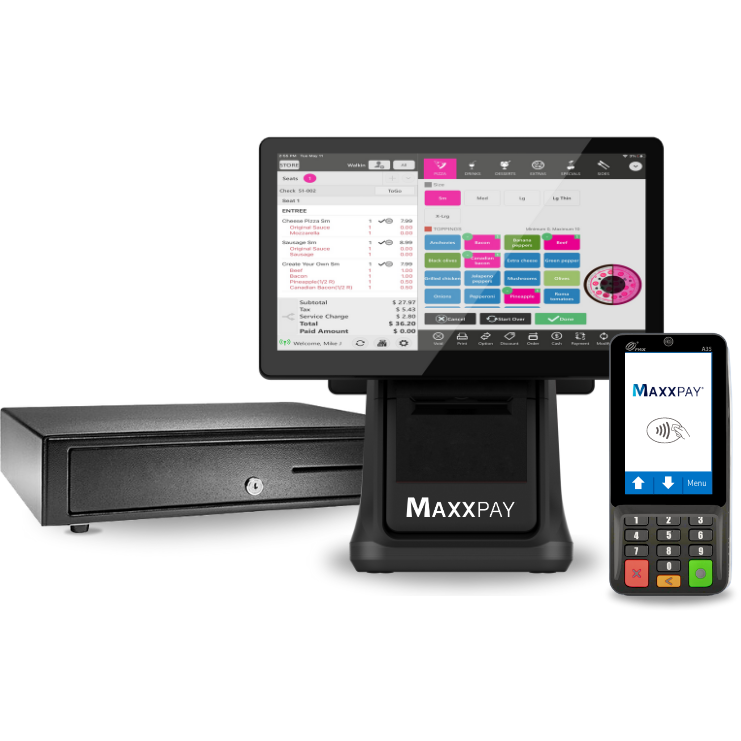Comprehending the Value of POS Software in Modern Retail Procedures
In today's retail landscape, the duty of POS software has come to be significantly significant. These systems have actually transformed from fundamental sales register to diverse devices that boost different elements of procedures. They not just simplify deals however also supply understandings that can form organization strategies. Comprehending how these systems effect customer experience and supply monitoring is necessary for any kind of store seeking to remain competitive. The ramifications of these developments require more exploration.
The Development of POS Software Program: From Deal Processing to Comprehensive Solutions
As retail environments developed, so also did the functionality of Factor of Sale (POS) software application, which moved from basic deal processing systems to sophisticated, complete options. POS systems primarily handled sales deals, taking care of cash money signs up and printing receipts. With advancements in technology, these systems started incorporating inventory administration, client relationship administration, and sales analytics. Sellers identified the need for seamless operations and real-time information, prompting the advancement of cloud-based POS services that enabled remote access and enhanced scalability.Additionally, the rise of mobile business necessitated POS systems to adjust, making it possible for purchases using tablets and smart devices. This transformation not only structured operations but also improved reporting abilities, allowing stores to make educated decisions based upon thorough information understandings. Contemporary POS software program has come to be integral to retail strategy, serving as a multifunctional tool that sustains numerous functional aspects beyond plain purchase processing.
Enhancing Consumer Experience Via Advanced POS Features
While lots of sellers concentrate on functional performance, progressed POS attributes increasingly focus on enhancing the consumer experience. Modern POS systems currently offer functionalities such as mobile payment options, individualized promos, and client commitment programs, which promote an even more interesting purchasing setting. By improving the checkout process, these systems lower wait times, enabling customers to complete deals quickly and efficiently.Additionally, integrated client relationship monitoring (CRM) functions enable stores to track buying behaviors and choices, assisting in customized marketing initiatives. This personalization not only develops client commitment yet additionally improves total satisfaction.Moreover, advanced analytics offered by POS systems can help merchants understand client fads and preferences, allowing them to make educated choices regarding product offerings and store designs. Inevitably, the concentrate on consumer experience with sophisticated POS features not only fulfills contemporary consumer assumptions however also drives repeat service and enhances profits for sellers.
Streamlining Inventory Monitoring With Integrated POS Equipments
Integrated POS systems play an important role in simplifying stock administration by automating procedures that generally called for significant manual initiative (Restaurant POS Software). These systems make it possible for stores to track supply degrees in actual time, eliminating discrepancies that typically occur from hands-on supply matters. With features such as barcode scanning and automatic stock replenishment notifies, services can preserve suitable inventory levels without overstocking or stockouts.Furthermore, incorporated POS systems facilitate precise projecting by examining historic sales data, allowing stores to make enlightened getting decisions. This predictive capability helps organizations adjust to altering consumer needs and seasonal patterns more effectively.Additionally, the centralization of supply information throughout multiple sales channels improves visibility, enabling retailers to handle their stock extra successfully. Eventually, the integration of POS systems into stock monitoring simplifies procedures, minimizes human error, and adds to enhanced earnings
Real-Time Sales Tracking and Reporting for Informed Decision-Making
Precise stock monitoring lays the groundwork for efficient sales monitoring and coverage. Real-time sales tracking enables retailers to monitor sales efficiency as it occurs, offering immediate insights into client purchasing patterns and trends. This capability enables organizations to respond promptly to changes in need, enhancing supply degrees and lessening overstock or stockouts.Moreover, incorporated POS systems assist in the generation of detailed reports, highlighting vital metrics such as sales by category, amount of time, and private items. Such coverage capabilities encourage sellers to make data-driven decisions, determining successful techniques and areas requiring improvement.

The Duty of POS Software Application in Consumer Connection Monitoring
POS software application plays a necessary duty in improving client partnership monitoring by allowing merchants to execute individualized marketing techniques. By assessing client data, organizations can tailor promotions and interactions to satisfy individual preferences. In addition, these systems promote the growth of improved loyalty programs that motivate repeat service and enhance consumer engagement.
Personalized Marketing Strategies
As retailers progressively look for to enhance consumer loyalty and engagement, personalized advertising and marketing methods have actually become an essential component of reliable client partnership monitoring. POS software program plays an important function in this procedure by assessing and gathering client information, allowing stores to customize advertising efforts to specific preferences and shopping actions. By leveraging insights from acquisition backgrounds, retailers can develop targeted promos and customized communications that reverberate with clients, cultivating a much deeper connection. In addition, the assimilation of POS software application with consumer partnership management systems allows for smooth monitoring of client interactions, ensuring that marketing techniques continue to be timely and relevant. This data-driven strategy not only improves consumer contentment yet additionally drives sales and urges repeat company, strengthening the store's market setting.
Enhanced Loyalty Programs
Retailers are progressively recognizing the significance of commitment programs in fostering long-lasting consumer partnerships and enhancing general involvement. POS software plays an essential duty in the growth and management of these programs, enabling retailers to track consumer behaviors, preferences, and purchases effectively. By leveraging information analytics, companies can produce tailored rewards and motivations that reverberate with individual consumers, consequently raising involvement in commitment programs. In addition, POS systems enable seamless integration with electronic platforms and mobile apps, facilitating simple access to promos and rewards. This not only boosts customer contentment yet also drives repeat service. Ultimately, POS software equips merchants to cultivate much deeper connections with their clients, changing occasional consumers right into dedicated customers with targeted and click here significant engagement techniques.
Integrating POS Systems With Shopping Operating Systems for Omnichannel Success
To accomplish real omnichannel success, seamless integration between point-of-sale (POS) systems and e-commerce platforms is essential. This combination allows stores to merge their inventory monitoring, making certain that product schedule is properly reflected across both online and physical stores. Clients gain from a cohesive buying experience, where they can conveniently switch between networks without coming across discrepancies.Furthermore, incorporated systems assist in real-time information sharing, allowing organizations to analyze client habits and preferences more effectively. This data-driven strategy allows sellers to customize advertising strategies and maximize supply levels, inevitably improving customer contentment and driving sales.Additionally, the ability to process purchases across platforms simplifies procedures, lowering the risk of mistakes and enhancing general effectiveness. As retailers significantly take on omnichannel strategies, the integration of POS systems with ecommerce systems remains a vital consider accomplishing lasting development and maintaining affordable advantage in the dynamic retail landscape.

Future Patterns in POS Technology and Their Effect On Retail Operations
As retail operations evolve, future patterns in POS innovation are readied to improve the landscape significantly. The rise of cloud-based options, innovations in mobile POS systems, and the benefits of AI integration are among the essential advancements anticipated to improve effectiveness and client experience. These developments guarantee to streamline processes and foster an extra vibrant retail atmosphere.
Cloud-Based Solutions Rise
With the increasing dependence on innovation, cloud-based POS solutions are changing retail operations by offering improved flexibility and scalability. These systems allow retailers to accessibility real-time information from anywhere, assisting in far better decision-making and consumer website service. By leveraging cloud infrastructure, businesses can reduce ahead of time costs connected with hardware and software application installations while making sure smooth updates and maintenance. In addition, cloud-based solutions sustain multi-location management, permitting merchants to integrate supply and sales throughout numerous outlets easily. This flexibility is necessary in today's fast-paced market, where consumer choices change quickly. As even more stores embrace these remedies, they can expect enhanced functional effectiveness and a more responsive approach to market needs, inevitably improving customer contentment and commitment.
Mobile POS Innovations
The evolution of retail modern technology remains to form operations, especially with the surge of mobile POS developments. These systems allow retailers to process purchases anywhere within the store, boosting consumer interaction and simplifying check out processes. Mobile POS solutions boost stock monitoring by permitting immediate access to supply degrees, aiding team aid customers extra successfully. Furthermore, they facilitate personalized purchasing experiences via incorporated client information and loyalty programs. As mobile tools become progressively innovative, retailers are embracing attributes such as contactless settlements and digital receipts, additionally optimizing the buying journey. The change in the direction of mobile POS not only improves operational performance but likewise straightens with the growing customer choice for ease, making certain that stores stay affordable in a rapidly advancing market.
AI Combination Benefits
AI assimilation represents a transformative jump in POS innovation, using merchants a myriad of advantages that enhance operational effectiveness and consumer experience. By leveraging artificial intelligence algorithms, sellers can examine buying patterns and maximize inventory administration, minimizing waste and stockouts. Additionally, AI-powered analytics give personalized advertising recommendations, enabling targeted promos that raise consumer engagement and commitment (Restaurant POS Software). Chatbots and online assistants streamline customer service, permitting for quicker resolution of queries and enhancing the overall purchasing experience. Predictive analytics can likewise forecast need patterns, allowing smarter staffing and source appropriation. Eventually, the combination of AI in POS systems encourages sellers to make data-driven decisions, fostering an one-upmanship in an ever-evolving retail landscape
Regularly Asked Concerns
What Are the Costs Connected With Applying POS Software?
The prices connected with carrying out POS software application can include software application licensing costs, equipment expenditures, installment costs, training prices, and recurring maintenance. Each aspect adds to the total investment needed for a successful execution.
Exactly How Can Tiny Retailers Take Advantage Of POS Systems?

What Equipment Is Needed for a POS System?
A normal POS system requires crucial hardware elements, including a touchscreen display, cash money cabinet, barcode scanner, receipt printer, and payment terminal. These elements work together to facilitate efficient deal handling and stock monitoring for sellers.
Can POS Software Program Be Customized for Particular Retail Needs?
POS software application can indeed be tailored to meet details retail needs. This versatility permits services to customize features, interfaces, and reporting tools, boosting operational efficiency and giving a much more tailored experience for both team and consumers.
Exactly How Safe And Secure Is Client Data in POS Solutions?
The safety of consumer data in POS systems differs widely. Numerous systems apply file encryption, safe accessibility controls, and regular updates, but vulnerabilities can still exist, necessitating ongoing watchfulness and proactive measures from stores to safeguard sensitive info. By streamlining the checkout procedure, these systems decrease wait times, permitting customers to complete deals quickly and efficiently.Additionally, incorporated consumer connection monitoring (CRM) features make it possible for merchants to track buying preferences and actions, promoting tailored marketing efforts. As stores progressively look for to improve consumer commitment and involvement, individualized marketing strategies have arised as a necessary element of reliable client partnership management. Furthermore, the integration of POS software with consumer connection monitoring systems allows for seamless monitoring of customer interactions, making certain that advertising and marketing methods remain prompt and appropriate. Customers benefit from a natural buying experience, where they can conveniently change between channels without experiencing discrepancies.Furthermore, incorporated systems facilitate real-time data sharing, enabling businesses to analyze customer actions and choices extra effectively. Little merchants can profit from POS systems with boosted transaction performance, streamlined supply monitoring, and improved client insights.